Take a photo of a barcode or cover
A really dark version of that one kid on the playground whose dad left and he tells you the dad is actually a secret agent.
Steve Hodel makes a very convincing argument, and I'm definitely inclined to believe that his theories, both about his father being the murderer and the murder being only one of a string of killings, are correct.
That being said, this book was a bit hard to get through. Something about the writing just put me off a little bit. It still gets a solid four star rating and a strong recommendation from me, though. It's a must-read if you're interested in true crime, the Black Dahlia, or police corruption in the LAPD.
That being said, this book was a bit hard to get through. Something about the writing just put me off a little bit. It still gets a solid four star rating and a strong recommendation from me, though. It's a must-read if you're interested in true crime, the Black Dahlia, or police corruption in the LAPD.
Starts off very strong, captivating, can't put it down good. But it goes on a bit long and we get the point - the author think his dad is the killer.
It is an interesting premise with some compelling facts - but the author keeps going long after the strong facts have been stated and continues with less compelling evidence that just waters down his argument and the book.
It is an interesting premise with some compelling facts - but the author keeps going long after the strong facts have been stated and continues with less compelling evidence that just waters down his argument and the book.
challenging
dark
informative
slow-paced
The information was interesting, but the entire book read like a police report. A little hard to get through.
If you so much as whisper Black Dahlia, people will be interested. Steve Hodel knew as much and uses his chief proposition — that his father killed Elizabeth Short — to make a series of unsubstantiated and increasingly outlandish claims.
Here’s the thing: if Hodel stuck to the facts, he would make a solid case for his father George’s guilt, both in the Black Dahlia slaying, Tamar’s abuse, and maybe even the Red Lipstick murder. Taken apart from the rest of the book, these sections are relatively convincing, especially when paired with the updated microphone recordings where Dr. Hodel seems to admit guilt.
However, Steve is not satisfied with simply pronouncing his father’s guilt in this crime: he must declare his father is a serial killer responsible for any LA-area murder where the suspect was an attractive brunette man. Proposing him as a suspect is one thing; announcing that he is “likely” or “definitely” the killer with no real evidence is unprofessional. He often mischaracterizes “unable to rule out” or “likely” handwriting evidence as being absolute fact beyond a shadow of a doubt. These leaps in judgment show that Hodel has no objectivity in examining his father. Once he’s found evidence of George’s misdoings, Hodel must make him out to be one of the most prolific serial killers of all time, perhaps as an homage to George’s desire for extreme and absolute perfection.
Am I convinced that Dr. George Hill Hodel is the Black Dahlia Avenger? I think it’s very likely, given his proximity, his surgical skill, the LAPD investigation, and his subsequent secret recordings. It’s undebatable that the LAPD was beyond corrupt in the 40s, and we will probably never know all of the facts. Do I think Hodel was guilty of other crimes? Probably, like incest. Do I think he did everything his son claims in this book and others, like that he’s the Zodiac Killer? No way. Please don’t mistake circumstantial evidence or theories with absolute proof.
Here’s the thing: if Hodel stuck to the facts, he would make a solid case for his father George’s guilt, both in the Black Dahlia slaying, Tamar’s abuse, and maybe even the Red Lipstick murder. Taken apart from the rest of the book, these sections are relatively convincing, especially when paired with the updated microphone recordings where Dr. Hodel seems to admit guilt.
However, Steve is not satisfied with simply pronouncing his father’s guilt in this crime: he must declare his father is a serial killer responsible for any LA-area murder where the suspect was an attractive brunette man. Proposing him as a suspect is one thing; announcing that he is “likely” or “definitely” the killer with no real evidence is unprofessional. He often mischaracterizes “unable to rule out” or “likely” handwriting evidence as being absolute fact beyond a shadow of a doubt. These leaps in judgment show that Hodel has no objectivity in examining his father. Once he’s found evidence of George’s misdoings, Hodel must make him out to be one of the most prolific serial killers of all time, perhaps as an homage to George’s desire for extreme and absolute perfection.
Am I convinced that Dr. George Hill Hodel is the Black Dahlia Avenger? I think it’s very likely, given his proximity, his surgical skill, the LAPD investigation, and his subsequent secret recordings. It’s undebatable that the LAPD was beyond corrupt in the 40s, and we will probably never know all of the facts. Do I think Hodel was guilty of other crimes? Probably, like incest. Do I think he did everything his son claims in this book and others, like that he’s the Zodiac Killer? No way. Please don’t mistake circumstantial evidence or theories with absolute proof.
This took me over a year to read with several breaks for my own sanity. The book has so much information and it is written in a way that can be a little daunting and hard to keep up with. I would describe this book as being written exactly how you would expect an ex-cop to write a true crime book where they are laying out all the evidence of their case. It is almost like a cop writing his report to give to prosecutor. At times it is hard to get through, but it is all important to proving to Mr. Hodels point, which I think he does very well. Overall, the book is very good and highly informative.
Steve Hodel has entirely convinced himself of two things: his father's guilt in a number of murders, the most prominent being that of the infamous Black Dahlia; and the LAPD's complicit cover-up of him being considered as a suspect, which continues to this day, according to his book. I can appreciate the zeal with which he presents his case, both as a former investigator and as the offspring of an "evil" man, but the circularity and uncertainty of the evidence he uses to argue his point frustrate me. Perhaps if he had access to the physical evidence - which he continually refers to as things that would potentially verify his conclusions - I'd have taken his assumptions for more than face value. As it stands, the book is a very long assessment of evidence that ultimately proves nothing; his proximity to his suspect notwithstanding, this is simply a very well done work of historically-based fiction that can never be proven, much like [a:James Ellroy|2887|James Ellroy|http://photo.goodreads.com/authors/1251268467p2/2887.jpg]'s [b:The Black Dahlia|21704|The Black Dahlia|James Ellroy|http://photo.goodreads.com/books/1167323078s/21704.jpg|434].
I read this several years ago, when it came out. I came into it skeptical, as I'd read a lot about this case. I finished it convinced. After this second reading, I'm even more convinced. Steve Hodel put together a complex and detailed case with a lot of compelling evidence.
dark
emotional
informative
slow-paced



